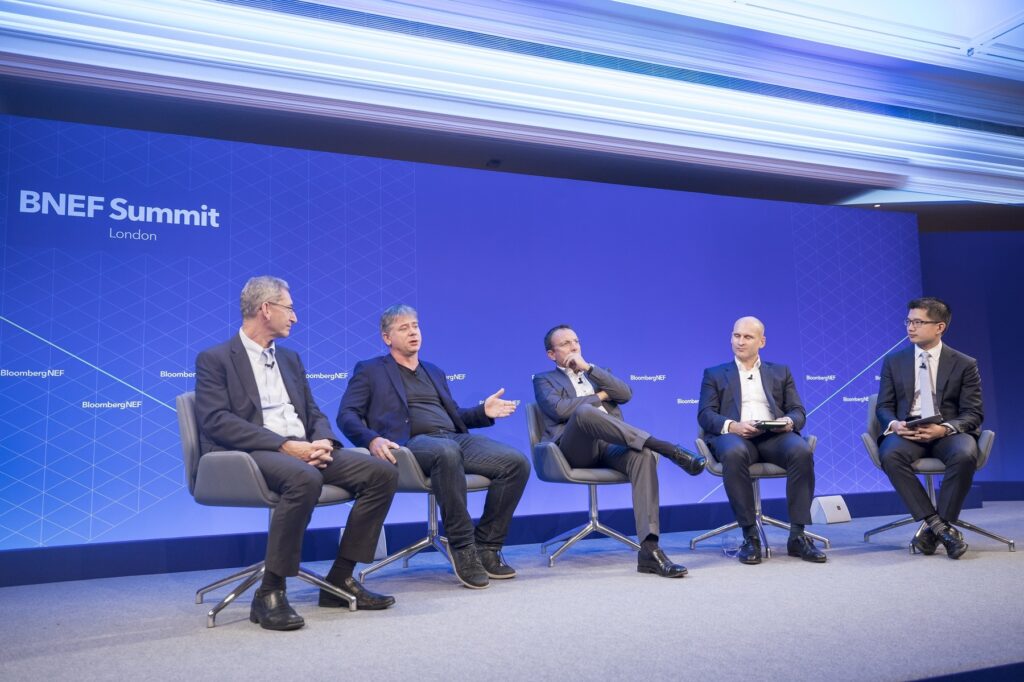The energy retail space is “ripe for disruption” and new entrants stand to overhaul the sector in the coming years, a panel has concluded.
The panel at this week’s BloombergNEF Summit in London featured speakers from energy heavyweights approaching the retail space from different angles. O&G majors BP and Shell are diversifying their offerings into consumer-led business units, while Enel X is a spin-out of Italian utility Enel. Octopus, meanwhile, has been operating in the UK for three years now having been borne out of the Octopus Group of companies that also includes the UK’s largest asset holder of operational solar farms.
All four representatives agreed that the sector was set for intense change in the coming years. Shell’s Mark Gainsborugh described it as “ripe for disruption”, ultimately concluding that new actors will enter as they smell opportunities in the space.
But rather than just ceding ground, Gainsborough, who is executive vice president at Shell’s New Energies unit, said that large incumbents will not just “pack up and go home” but look to play in this space for the foreseeable future.
Enel X’s Francesco Venturini said the reason behind the interest in the sector is simple. “Electrification is sexy now… and a lot of industries are now entering the space,” he said.
Nick Wayth, chief development officer at BP Alternative Energy, said that supply market disruption will not be a “jagged edge” but instead take time. “We are entering a world not of divergence, but of convergence,” he said, hinting at an emerging theme within the energy sector of companies becoming far more vertically integrated than before. As well as outsiders from otherwise unrelated sectors entering.
This was also picked up by Octopus chief executive Greg Jackson, who said that for the supply market the revolution was “just beginning”. Pointing towards the internet as an example, Jackson said that online communication didn’t just stop with email or Facebook but spawned other entrants like WhatsApp and Instagram, which in turn triggered an evolution in consumer demand.
It’s for this reason that suppliers are now placing consumers at the heart of their strategy and product offerings, delivering tangible benefits not just to bill payers but the whole energy system.
Boring energy and the future customer
“That energy is boring is a myth created by the sector because it wasn’t good at engaging with the consumer,” Jackson said, responding to a question about how retailers are improving their customer engagement processes.
Octopus’ customer base has risen meteorically, and now boasts 1.2 million customers, sitting them comfortably amidst a raft of challengers gunning for the legacy ‘Big Six’. Often cobbled together alongside Bulb and OVO – which itself will become the second-largest energy retailer in the UK should its acquisition of SSE Energy Services receive regulatory approvals – Octopus has entered the market boasting a portfolio of innovative tariffs and consumer products tailored very much towards a more engaged and conscientious customer.
Venturini’s opinion was that energy is not boring, just that customers take it for granted. High levels of energy security had meant that consumers are safe in the knowledge that they have power at their disposal, whether to turn on a light switch or household appliance, whenever they like.
Gainsborough said the changing demands of consumers was critical for energy suppliers to understand, and called on retailers to learn from other consumer-facing businesses in order to strike the right balance. New business models will inevitably take time to scale-up, he said, but pointed towards residential virtual power plants (VPPs) and domestic battery storage aggregator – which his firm is working on alongside sonnen having acquired it earlier this year – as a possible hint as to where Shell feels the market may move to.
This was also alluded to by Jackson, who said that the presence of zero marginal cost electrons on the system – driven by a proliferation of renewables on power grids – was allowing suppliers to “embrace consumers as market participants” rather than just willing buyers.
This would, however, require retailers to actually engage with customers on a regular basis, something incumbents have looked to avoid. “The genie’s now out of the bottle,” Jackson added, adding that incumbents had grown averse to “poking the sleeping dog”.
“The trouble is if you don’t poke the dog [now], someone else will.”
Trust in energy companies in the UK is notoriously low. Price increases have contributed to accusations of profiteering that some incumbents often looked to defuse by attributing the blame to low carbon levies. Jackson was unequivocal in his condemnation of this practice, arguing that it risked setting the public against the overriding change – the decarbonisation of power generation – that is needed.
But Jackson reserved special criticism for the “hide and seek economics” that have plagued the retail sector and perhaps done more to decrease trust in retailers than any other act. Tempting consumers into cheap, one-year tariffs that lapse onto far more costly arrangements have been damaging, Jackson said, and must end.
Ultimately, the retail sector is being squeezed from multiple angles. Made to jump through more hoops than ever before from a regulatory perspective, energy suppliers face significant technological change and a maturing customer base that demands more for a lower price. New entrants are changing the game, and the panel was unanimous in its verdict that change will be a rare constant for the supply market moving forward.






